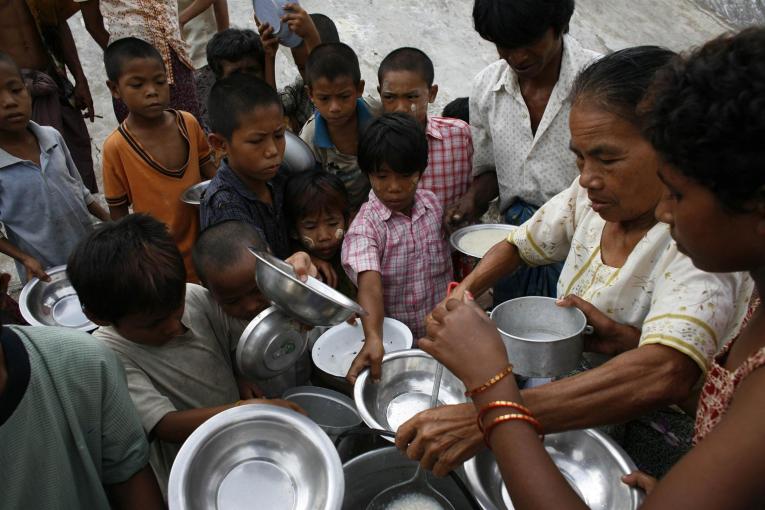1. Mitigate corruptive activities
In order to reduce the issue of malnutrition, governments all over the world have to take measures to reduce corruptive activities. This means to reduce corruption in their own country but also to stop corruption in other countries. This could be accomplished by stopping trade activities with countries that are known for high corruptive activities until they change their political system. Thus, these countries will have a big incentive to change their system since they would otherwise suffer from serious long-term economic consequences. In turn, a reduction in corruptive actions will also lower the problem of malnutrition.
2. Mitigate gender discrimination
Many women all over the world suffer from gender inequality. Women are often not regarded as equally important as men and therefore have plenty of disadvantages in their daily life, including an increased chanced for malnutrition. Hence, it is crucial to reduce gender inequality so that women get equal rights and can protect themselves from poverty and the resulting malnutrition issue more properly.
3. Global support for poor countries
Governments all over the world have to make sure that there are sufficient global aid programs for poor countries in place to stop extreme poverty and the resulting hunger issue. In fact, fighting extreme poverty and hunger is one of the Millennium Development Goals set by the United Nations. There are also some additional programs in place which try to prevent hunger and malnutrition, like the World Food Programme. Thus, we are on a good path regarding fighting hunger and malnutrition. However, there could always be done more and governments from rich countries all over the world should feel obliged to increase their efforts to support poor countries.
4. Redistribute wealth
It is crucial that governments try to distribute wealth in their country more equally. In many poor developing countries, small groups of elites often own almost all of the wealth.
Through redistribution, poverty levels of the general public could be lowered and therefore also the malnutrition problem could be mitigated.
5. Give companies incentives to open branches in poor regions
In order to mitigate poverty and the resulting hunger issue, it is crucial that poor regions try to attract companies in order to create more jobs. This could come in the form of tax advantages or other financial subsidies. By doing so, the incentive for firms to relocate to these areas increases and through the creation of jobs, more people may be able to escape poverty and therefore to buy enough food to avoid hunger.
6. Reduce waste production
One measure against global hunger that everyone of us can take in our daily life is to reduce our waste production. Since part of our waste is burned, it leads to the emission of harmful greenhouse gases which in turn contribute to global warming which eventually contributes to hunger and food shortages. Therefore, everyone should try to reduce waste whenever possible. This could mean avoiding the use of disposable plastic cups or buying items with excessive packaging.

7. Reduce consumption levels
Another related point to indirectly reduce hunger due to global warming is to reduce our consumption levels. Everyone seems to need the newest versions of electronics and the hippest clothes in our nowadays society. However, this also often implies that many items that are still working are disposed into the trash bin. This consumption behavior results in enormous amounts of unnecessary waste, which in turn contributes to global warming and hunger for many people. Thus, it is crucial that everyone of us tries to lower their consumption in order to fight hunger on an individual level.
8. Donations
Donations for organizations that aim to fight hunger may be another suitable measure to reduce worldwide hunger. For instance, you could donate to the World Food Programme or other organizations. Just make sure that you donate to official organizations and not scammers who just want to rip you off and keep the money for themselves.
9. Avoid food delivery
Since food delivery also contributes to the emission of greenhouse gases and therefore to global warming, you should refrain from using food delivery services and instead cook your own meals at home.
By doing so, you can further improve your ecological footprint since you also reduce waste production.
10. Use alternative means of transport
You should also try to use your car less often and to switch to public transport or other alternative means of transportation instead. By doing so, you can reduce your greenhouse gas emissions and therefore also mitigate the hunger issue in regions that will be heavily hit by the effects of global warming.
11. Educate yourself
You should also educate yourself on a constant basis regarding what you can do to fight world hunger. Maybe you want to join an organization that fights global hunger or you take other measures. Whatever you prefer, you can make a big contribution to mitigate the global hunger issue.
(Solutions on https://environmental-conscience.com)


